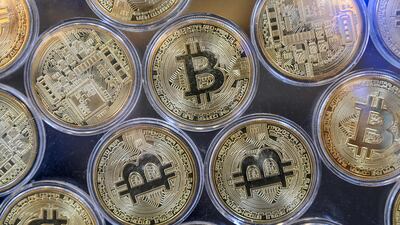Bitcoin, the world's largest cryptocurrency, surged to a record high on Wednesday after the debut of the first futures exchange-traded fund of the digital currency on Wall Street.
The launch of the Bitcoin futures exchange-traded fund on the New York Stock Exchange on Tuesday created huge demand for the cryptocurrency, which soared to $66,976 on Wednesday. The highly volatile cryptocurrency fell to $64,512 at 7:38am UAE time on Thursday.
The world's most popular cryptocurrency, created 13 years ago and long regarded as the preserve of internet geeks and hobbyists, has been embraced by many major banks. Still, some US investment banks have reportedly prevented their brokers from placing clients in the new Bitcoin ETF.
AvaTrade analyst
The new fund is a more accessible vehicle that puts Bitcoin within the grasp of even more investors.
"Interest in Bitcoin in the wake of yesterday's new ETF launch has helped to push the cryptocurrency to a new record high," CMC Markets analyst Michael Hewson told AFP. "Bitcoin is more or less mainstream already with various banks offering clients exposure to it. This merely takes it to the next level."
The Bitcoin Strategy ETF rose nearly 5 per cent in its first day of trading on Tuesday.
Bitcoin itself has now gained more than 50 per cent over the past month, and 450 per cent over the past year. This week's stellar gains have also sparked talk of it hitting $100,000 in the coming months.
"The party is on," said AvaTrade analyst Naeem Aslam. "The fact is that this is only a beginning. Given the price momentum we are seeing on the back of Bitcoin's ETF, we believe that Bitcoin can easily go all the way to $100,000 by the end of this year."
Investors should, however, remain cautious over the volatile unit, Oanda analyst Craig Erlam told AFP. "The ETF is an incredibly important move to getting mainstream investors on board," Mr Erlam said.
"That is not to say there will suddenly be a pile into Bitcoin. It's still a highly speculative and volatile instrument. But it's a step in the right direction for an asset class that's craving institutional acceptance."
The unit hit its earlier record of $64,870 in April, before the Nasdaq debut of cryptocurrency exchange Coinbase, but plunged in May on Chinese regulatory concerns.
China has clamped down on trading and mining cryptocurrencies, which are created through solving complex equations in an endeavour that uses enormous amounts of energy.
But Bitcoin was buoyed in September after it became legal tender in El Salvador, in a world first.
Banks remain sceptical
Many central banks remain sceptical over Bitcoin because of its shadowy nature and the fact that it remains unregulated, while criminals have been attracted to it for the same reasons.
Cryptocurrencies are not a unit of account and calling them currencies is a “misnomer”, according to Nouriel Roubini, and prominent economist and chairman of New York-based consultancy Roubini Macro consultancy, who is well known for predicting the subprime mortgage crisis in the US and the subsequent 2008 global financial crisis.
chair of Roubini Macro
“Cryptocurrencies may have an asset value but based on my definition they are not currencies. That’s a fact,” Mr Roubini said at an investment conference in Dubai last week.
“If something is volatile [at] 5 to 10 per cent, [it] cannot be a currency. A currency has to have a stable value relative to the price index of goods and services.”
The new Wall Street ETF could help to address regulatory concerns about Bitcoin, said XTB analyst Walid Koudmani.
The ETF "is a big step for cryptos overall since it opens the possibility for many traditional investors who were reluctant to enter the market due to associated risks, such as lack of regulation and the underlying security risks", Mr Koudmani said.
"This, along with the increasing media interest in the crypto space, could boost demand and bring a new wave of liquidity in the markets which could ultimately push prices to new highs."












